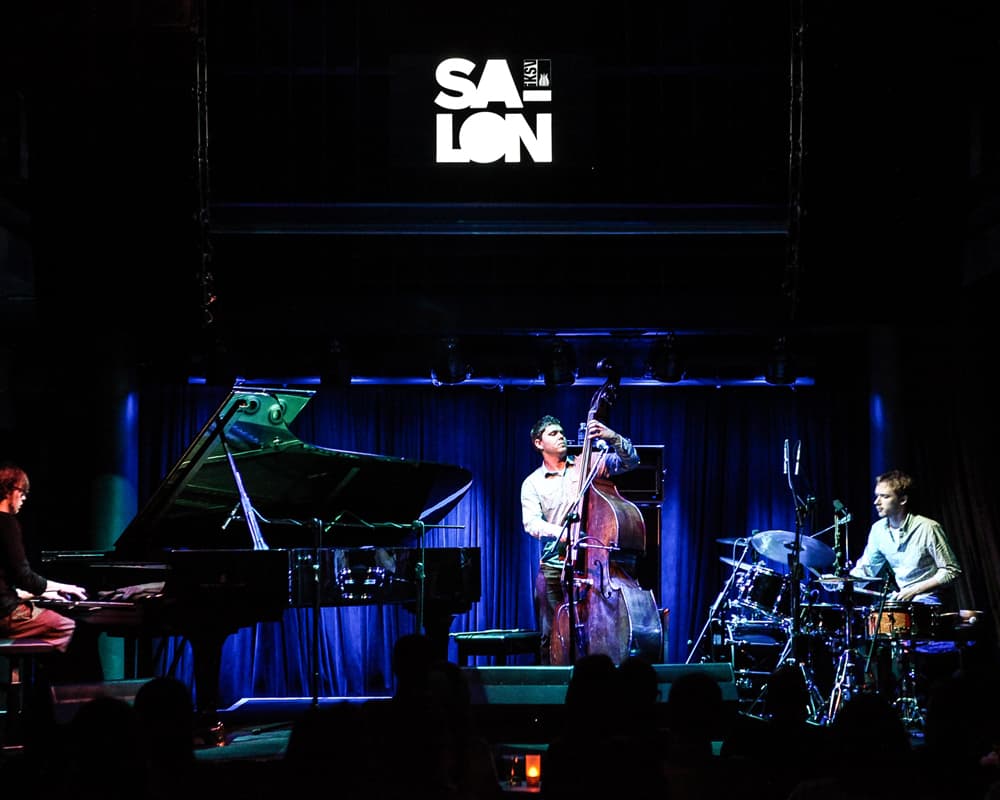 As a band name, ‘GoGo Penguin’ doesn’t exactly carry the weight or edginess that one usually associates with a jazz trio. But as soon as they took the stage at Salon IKSV on Friday night, I learned that this group is not your average jazz trio. In fact, the sounds they produced over the course of their set went beyond jazz and delved into electronica, an especially impressive feat when you consider that they were only working with a piano, upright bass and set of drums.
As a band name, ‘GoGo Penguin’ doesn’t exactly carry the weight or edginess that one usually associates with a jazz trio. But as soon as they took the stage at Salon IKSV on Friday night, I learned that this group is not your average jazz trio. In fact, the sounds they produced over the course of their set went beyond jazz and delved into electronica, an especially impressive feat when you consider that they were only working with a piano, upright bass and set of drums.
It wasn’t GoGo Penguin‘s first visit to Istanbul. The band, hailing from Manchester and featuring Nick Blacka on bass, Rob Turner on drums and Chris Illingworth on piano, came to the city last year and liked it so much that they decided to come again, or so Nick explained when they first came on stage. But that was practically it in terms of chit-chat — the band dove straight into the music and barely came up for a breather all night. You could tell they felt most comfortable when their instruments were doing the talking.
And those instruments, man. To understand their sound and how they function as a band, it’s important to describe their set-up. Nick and his bass were right in the middle of the stage; he was the only one who spoke during the show. From the crowd’s perspective, Rob and his drums were on the right and Chris was on the left, his piano taking up almost half the stage. I was expecting the piano to be front and center, both the physical focal point and the instrument that the others deferred to. And while the piano did carry the melody in a number of the songs and added a sound that was both delicate and haunting, the true star of the show was the upright bass.
Normally relegated to the back of the stage, where it serves up a deep but indiscernible bass line, the upright bass was the general, leading GoGo Penguin into battle. Both plucking and using a bow, Nick played like a tireless explorer, leaving no part of the instrument undiscovered. He used almost the entire fingerboard, the intensity building as his hands inched closer and closer to the center of the instrument. He even thwacked the belly and top of the bass during one song, a move I hadn’t seen before. It seemed to me to be part of the band’s larger aim — they used their instruments in unexpected ways to create very precise, very distinct sounds that were so in sync and came together so perfectly, you would be forgiven for thinking this was an expert DJ set.
This ability to play with such exactness was made most clear when GoGo Penguin would play around with tempo and rhythm. They would have these sudden stops and stutters and tremors, using the pauses and brief tempo increases to change the course of the song. For instance, on “Kamaloka” they started out slow and with a beautiful piano run, but then soon added a frenetic, yet controlled percussion line. The whole evening, Chris reminded me of a figure skater. Wait, stay with me. You know how when a figure skater is spinning, it looks like she won’t be able hold it and is just seconds from spinning out of control? Even though she is actually a boss and has total command of the move? That’s how I felt watching Chris play the drums. He was so precise and so damn quick, I kept thinking he was just about to lose it. But he never did.
Each song ebbed and flowed, building up to an all-encompassing crescendo that would instantaneously shift to a mournful and deep bass line or a simple, yet elegant piano run. The crowd was eating it up, and constantly clamored for more. This resulted in not one, but two encores. First GoGo Penguin played “Garden Dog Barbecue,” whose sound most resembled electronica in that it built you up and then almost immediately dropped you down. They finished with a cover of Massive Attack’s “Teardrop” which delighted the crowd and, oddly, ended the show with both a haunting whimper and a pleasing bang. Ultimately, even though at least half of the attendees were seated at tables, there was an intensity in the air — GoGo Penguin’s music had brought an energy that no one wanted to let go of.










